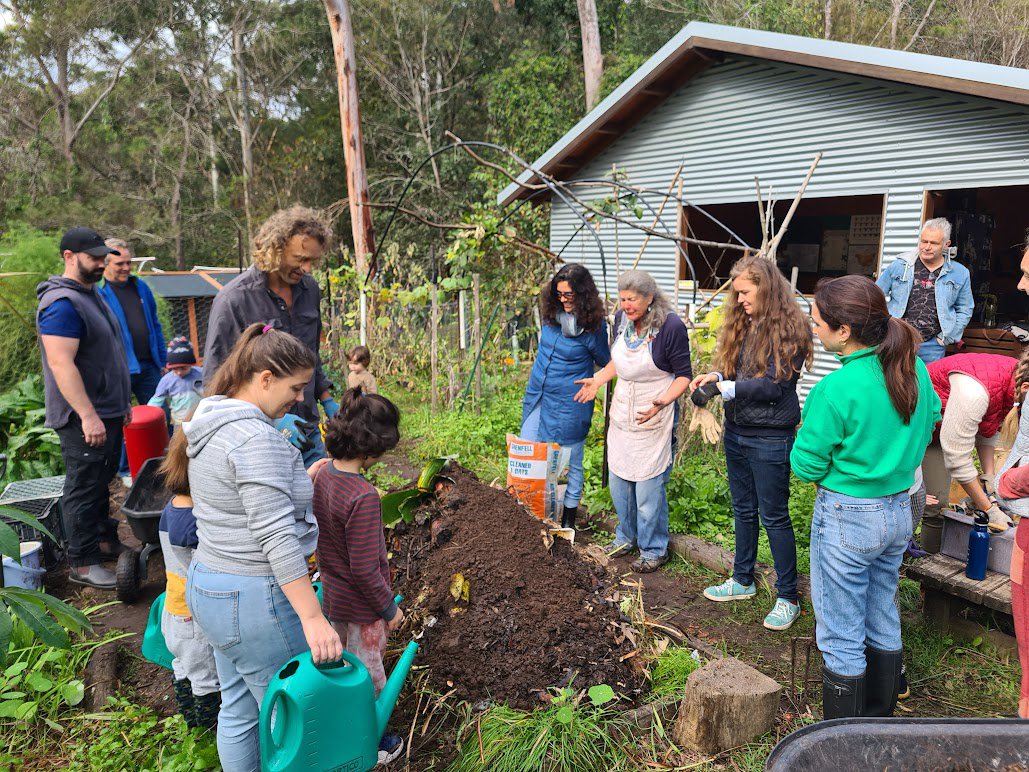
Soil Creation Family Workshop with Sandra Frain Wrap Up
Thunder heard in the distance didn't stop the sun shining on a recent Saturday morning (13th May), as around 50 people gathered in the biodynamic garden at Middle Cove - eager to get their hands dirty and have fun learning about soil creation, aka composting. Adults and children alike had a wonderful experience together with the wise and energetic guidance of Gardening Teacher Sandra Frain.
The purpose of this gardening workshop was “composing compost” by working and learning together to create soil through building a healthy biodynamic compost heap. Everyone contributed wonderfully to this wholesome activity and Sandra was delighted with the result: please read on for the step-by-step. As well as being a productive working bee that supports Sandra’s gardening lessons with the students, parent ed sessions like this are a valuable learning opportunity and build a beautiful culture and connection among Glenaeon families - with thanks to the GPA for their financial support.
The morning wrapped up with everyone sharing delicious pumpkin soup, fresh sourdough bread, warm herbal tea, and an impressive tamarillo cake - all made by parents and Sandra using pumpkins, herbs and tamarillo fruits from the school gardens. While everyone feasted and the children played happily outside, Sandra hosted a Q&A in the garden classroom - and at home time, she offered families generous gifts of plants, mature biodynamic compost and the famous 'worm juice' for their own gardens or balconies.
To learn more or enquire, please email Sandra on s.frain@glenaeon.nsw.edu.au
How we made a biodynamic compost heap
● We started by laying some sticks on a garden bed to keep the compost heap aerated. Then we emptied all the compost bins into wheelbarrows and dumped everything in a long heap of food scraps, plant prunings, office paper, and compostable take-away containers from the Gentle Café.
● The children spotted lots of lively earthworms and Sandra explained how lime powder sprinkled in the bins neutralises the odour of nitrogen and makes soil less acidic (more alkaline).
● Next we added straw from the chicken coop, cow and horse manure, sawdust from horse stables, corn husks, and kitchen scraps that people brought from home. The children crushed up the egg shells and we removed anything non-biodegradable.
● Sandra explained the importance of balancing the nitrogen and carbon content (as well as the moisture level) of a compost heap, aiming for ⅓ nitrogen-based (food scraps, coffee grounds, animal manure, etc.) and ⅔ carbon-based (dry leaves, paper, etc).
● While the children filled watering cans to keep the growing pile moist, other groups readied the biodynamic compost preparations for insertion and absorption into the heap.
● We sprinkled rock basalt, copper (in the form of borax), volcanic ash (from Mt Patagonia), powdered clay and zeolite (especially good for removing heavy metals from soil). Finally we carefully inserted the biodynamic compost preparations of yarrow, chamomile, nettle, oak bark, dandelion and valerian. These ingredients are available from the Biodynamic Association of Australia and Bunnings.
● Sandra explained how a good compost heap heats up to human blood temperature and takes around 8 weeks in our climate in winter til it's ready to create soil. Now we can look forward to an unveiling of the compost heap and using it to make rich new soil for spring planting.
Want to learn (and do) more in the school gardens?
● Sign up as a parent volunteer for gardening lessons, if your child is in Classes 1-6 (see the teacher or class parent, also noting this earns CIP points)
● Sign up to be part of the chicken care volunteer team for weekends and school holidays (contact Sandra for more info, and this also earns CIP points)
● Join Sandra's parent education workshops (look out for the next one in the newsletter)




